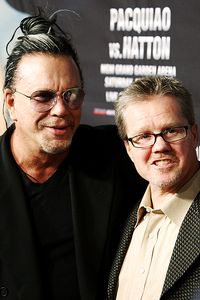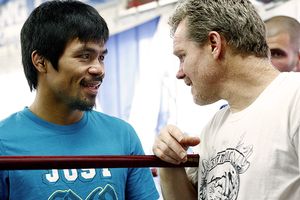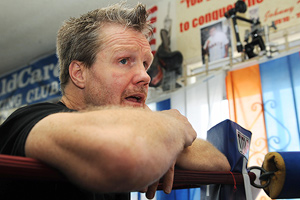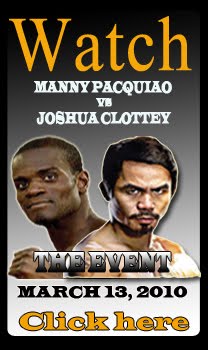Freddie Roach remembers clearly, even nine years later, the day an unfamiliar Filipino fighter walked unannounced into his gym.
"He walked in; I had no idea who he was, I had never heard of him before," Roach recalled recently. "His manager asked if I could work the mitts with him; they had heard I caught punches well. After one round, I went over to my people and said, 'Wow. This kid can fight.' And then he went over to his manager and said, 'We have a new trainer.'"
If the encounter was not inherently unusual -- boxers of all kinds walk in the doors of Roach's Wild Card Boxing Club every day -- it was almost immediately transformative. Roach had just met Manny Pacquiao, a man who, less than 10 minutes earlier, he didn't even know existed but with whom, less than 10 years later, he would storm into the sport's history books.
Pacquiao had already won two world titles when he arrived in Los Angeles in search of Roach, but with his new trainer in his corner, he would go on to win six more -- the first of them within a matter of weeks, in their first fight together. It was an opportunity that might never have come had the fighter not been where he was, when he was.
IBF super bantamweight champion Lehlohonolo Ledwaba was scheduled to defend his title in the co-main event of Oscar De La Hoya's challenge of junior middleweight strap holder Javier Castillejo, but when Ledwaba's original opponent, Enrique Sanchez, pulled out, the South African needed a new dance partner.
"It was just timing. Everything worked out perfectly," Roach said. "From my gym, he told me he was going to go to San Francisco, and then he was going home. But we hit it off in the gym, and so he stayed, and then the opportunity came up."

Ledwaba has become something of a forgotten champion, not least because of what happened to him against Pacquiao that June evening at the MGM Grand. But at the time, he was regarded as a dangerous champion and a potential star in the making.
"I had Johnny Tapia at the time and Tapia's wife was his manager and she didn't want to go near Ledwaba," said Roach. "Nobody wanted to go near the guy. He was a killer. I was looking at the board in Vegas and seeing what the line was. Ledwaba was such a big favorite, they weren't taking any action on the fight."
But in an explosive performance that showcased what would become a familiar style, Pacquiao tore into the champion from the start, breaking his nose in the first round, dropping him in the second, and stopping him in the sixth.
Pacquiao and Roach had won their first world title together, and it had happened almost in the blink of an eye: One moment, they did not know each other, the next they were on top of the world.
But sometimes it happens like that. Sometimes an unexpected encounter can send a person's life in an unanticipated direction. Roach knows that better than most. After all, it had happened to him once before, 10 years earlier.
***
By the time he turned 38, Mickey Rourke had been one of Hollywood's most bankable and charismatic leading men for a decade. But for all the natural flair he displayed, acting had never truly been in Rourke's soul, and whatever satisfaction he had derived from it now had long since faded.
"I was tired of the acting at that point," he said via phone from a hotel room in Germany. "I was burned out. I wasn't enjoying it anymore."
He was developing a reputation for being difficult to work with; the offers of quality roles began to dry up, and his choices and performances became less inspired. Casting about for some kind of anchor in his life, Rourke turned to an earlier love.

"I had an amateur [boxing] career for about six years before I started acting," he said. "I had 28 amateur fights." But any hope he might have had of turning pugilism into a profession was extinguished by a pair of youthful concussions.
"The first concussion [happened when] I was about 17. I was at school, and the teacher was writing on the blackboard and it looked like Chinese; I looked over at the kid next to me and I couldn't remember his name. I felt sick to my stomach," he said.
Two years later, another concussion prompted a medical admonition to refrain from contact for at least six months. So, Rourke said, "I took a year off." He paused and chuckled: "I took more than a year off, I took a lot of years off, and I just got into acting by accident. But I always stayed in the gym."
After moving to Los Angeles, Rourke trained with Bill Slayton, whose earlier charges included Ken Norton and Michael Dokes and whose later pupils would include Lamon Brewster.
"I was knocking 'round a couple pros pretty good," Rourke said, "and one day I said to Bill, 'I think I want to turn pro.' We were like father and son, and he said, 'Listen, if you want to turn pro, I don't want to go there with you.'"
There, perhaps, it might have stayed, had it not been for another of those chance encounters. Rourke had befriended Gary Stretch, a British middleweight who, following the opposite career path to Rourke, was looking to gain a toehold in the movie business. One evening, the Englishman introduced the actor to an up-and-coming trainer named Freddie Roach.
Working under the tutelage of his mentor, the legendary Eddie Futch, Roach already had a couple of world champions -- Virgil Hill and Marlon Starling -- under his belt.
He was happy in Las Vegas, learning his trade and developing a reputation, and would not normally have uprooted to the City of Angels to train a 39-year-old with no professional experience. But this 39-year-old was different.
***
The fame and fortune of his new fighter didn't prevent Roach from working his charge hard.
"I remember, sometimes, I would drop my left arm after I threw a jab, and Freddie would snap off his mitt and cork me on the jaw with his right hand in a closed fist," Rourke said. "And I wouldn't drop my left arm again. Or, if I didn't have my right hand up high enough, Freddie had a damn good left hook himself, and he'd sock me right me on the chin. I respected that, you know? Sure, he was trying to hurt me a little bit, but he was doing it so that someone else wouldn't do it to me in a real fight."
The hardest blow that Roach delivered, however, was also the most productive of all.
"I wasn't training properly," Rourke said. "Freddie just packed his bags and went back to Vegas. He says, 'I'll see you in a month if you ever train the right way. I don't give a s--- who you are. I don't train people to lose.' I was in tears, literally. I said, 'Freddie, please,' and he said, 'No man, I'm not going to work with you with what you're giving me. If you want to train like that and be knocked on your ass, I'm not going to be in your corner.'"
Suitably chastised, Rourke rededicated himself, and Roach returned to his corner, until a failed neurological test ended Rourke's professional boxing career the way it had curtailed his amateur one.
"I always wanted to turn pro because it was something I gave up on, and I always felt bad about that. I just wanted to do it," Rourke said. "But it was a good ride. One of the things I lacked as an amateur and lacked as an actor was concentration and discipline. That's something that Freddie Roach instilled in me with boxing, and that I have been able to take back with me to acting. It's about being on time, being professional, being accountable. Those were all things I never had in my makeup as a person, that Freddie Roach instilled in me. I don't think I would be the actor that I am able to be today, coming back again, if I didn't have those lessons that I learned from Freddie Roach. And it starts from the time that he packed his bags."
Rourke returned to acting, but Roach remained in Hollywood, using the money he had earned from his time with Rourke to build himself his own gym. He called it the Wild Card Boxing Club.
***
Roach and Pacquiao developed a chemistry almost instantly.
"We did eight rounds," Roach said of that first session at the Wild Card, "and it was like I knew him my whole life. We didn't miss a beat."

Since then, the bond has grown only stronger. Pacquiao refers to Roach, smilingly but with respect as much as irreverence as "My Master," and Roach clearly looks upon his charge with fondness. Watching from afar, a previous pupil knows the reason behind this bond between boxer and trainer.
"Manny is so dedicated, he has such a strong work ethic, he listens to Freddie, he wants to improve," said Rourke. "With Freddie it's all about work ethic and respect."
Roach confirms his former disciple's assessment.
"Discipline and work ethic is my biggest thing," he said. "If you're a lazy fighter, go somewhere else. I don't have time for that. And one thing I'll say about Mickey: He learned discipline."
Watching Roach blossom into a four-time Trainer of the Year, perhaps the most sought-after cornerman in the business and a Hollywood celebrity in his own right, Rourke smiles and reflects on what has been.
"It's like, 'Hey, that used to be my trainer.' It makes me proud," he said.
"He's a really good soul. He's a good person. If Freddie Roach called me up on the phone and said, 'I need you,' I would pack my bags and go. I wouldn't care where I was. Freddie helped me fulfill a dream. It was six of the most enjoyable years of my whole life. I met a great friend that I'll have for the rest of my life."
There have been consequences to fulfilling that dream, he concedes.
"I don't have the greatest equilibrium in the world. My hands shake a little bit," he said.
Rourke chuckled again.
"I'm not as pretty as I used to be. But it was all worth it. And I owe it all to Freddie Roach."
Author: Kieran Mulvaney
Source: ESPN.com

















No comments:
Post a Comment